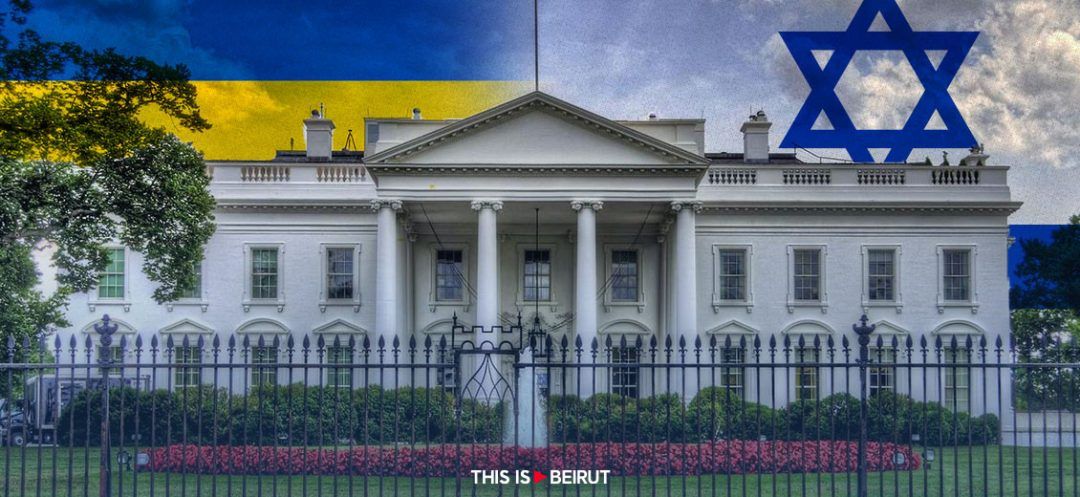- Home
- Middle East
- What Prompted Washington to Release Aid to Ukraine and Israel?

In a surprising twist of events, the United States House of Representatives recently passed a bill allocating substantial financial and military aid to Ukraine, Israel, and Taiwan.
This legislation — in a gridlock for over six months — that apportions an astronomical amount of $95 billion, finally received bipartisan support. The bill allocates $61 billion for Ukraine, $26 billion for Israel, and $8 billion for Taiwan, as part of efforts to counter China's growing power.
After its approval by the House of Representatives, the bill followed the democratic process. It was approved on Tuesday by the Senate, where the Democratic Party holds the majority, thus without encountering any serious opposition. It was then submitted to the custodian of the federal executive, President Joe Biden, who signed it on Wednesday.
This move, which followed months of heated debates over the pertinence of Washington's involvement in foreign conflicts, raises a fundamental question: what were the actual factors that led to the breakthrough?
The blocking of American aid, compounded by the inflexibility of the Republican Party, especially Trump’s partisans, has had devastating repercussions for Ukraine in its conflict with Russia. The isolationist stance advocated by the Republican candidate for the American presidency contributed to the parliamentary obstruction.
In a compromise effort, a proposal to couple a bipartisan bill for assistance to Ukraine with an allocation of additional funds to strengthen the southern borders and prevent illegal immigration was put forward. However, this initiative was deemed insufficient by former President Donald Trump, ultimately leading to the failure of both the immigration bill and, by extension, the American aid package.
However, strategic outreach efforts by Republican senators, a high-profile visit by House Speaker Mike Johnson, discussions with global leaders such as the Polish president and the British Foreign Secretary, David Cameron, as well as a politically significant minor amendment to the bill, convinced Donald Trump to refrain from impeding the approval of the bill. This paved the way for Mike Johnson to form a coalition of Republican representatives ready to vote in favor of this aid.
Trump’s Considerations
A key change in the bill was to allocate $9.5 billion in economic aid in the form of cancellable loans rather than subsidies, to align with an idea presented by Donald Trump a few months earlier. According to sources close to the former president — as reported by the Wall Street Journal — he would be open to taking into account the opinions of those who have warned about the potential consequences of a Russian victory. This comes at a time when CIA Director William Burns has expressed his knowledge of information and reports suggesting that Ukraine could lose its war with Russia by the end of the year if American and European aid are not allocated.
It is essential to highlight that Donald Trump is facing intense criticism regarding his potential handling of the Ukrainian dossier should he win the upcoming elections. In this context, Trump asserted that he would resolve the military conflict between Kiev and Moscow in less than 24 hours and negotiate a peace solution.
However, many observers fear that the former president may be inclined to favor Russia, especially given his overt closeness with Russian President Vladimir Putin, and that he may endorse a peace agreement that could grant some Ukrainian territories to Moscow, starting with the Donbass. Trump is also duly criticized for his anti-Atlantic stance and highly disproportionate positions regarding his Western allies.
Iranian Catalyst
Meanwhile, it seems like Iran might have been a catalyst in the adoption of the American aid bill.
The timing of this event, which followed the Iranian strikes on Israel, is probably not purely coincidental. While this factor may not have been the sole trigger, it nonetheless played a crucial role in expediting the process.
Despite its highly symbolic dimension, the Iranian attack on Israel was an unprecedented event. In fact, it marked Iran’s first direct assault on Israeli territory, using over 400 drones and ballistic missiles.
In addition, it should be emphasized that in the last few months, relations between Washington and Tel Aviv haven’t been at their best, mostly due to what were perceived as “disproportionate” Israeli attacks on civilians in Gaza. Joe Biden openly called for a ceasefire in the conflict between Israel and Hamas, challenging the approach of Israeli Prime Minister Benjamin Netanyahu, which he viewed as a "serious mistake." Some of Washington's Western allies had also begun to openly criticize Tel Aviv's decisions in the media.
However, the joint efforts of the United States and Britain in intercepting 99% of Iranian drones in Iraqi, Syrian, and Lebanese airspace, followed by the adoption of the $26 billion aid bill (surpassing the initially proposed $17 billion), seems to have been perceived as a triumph — at least media-wise — for an increasingly unpopular Benjamin Netanyahu.
In addition to these factors that led to the unfreezing of the aid, one shouldn’t overlook the increasing and unprecedented number (in 2023) of ongoing Chinese incursions in the South China Sea, mainly targeting Taiwan.
Today, the focus should be on the impact of this substantial American funding on the Ukrainian, Israeli, and Chinese fronts. Could the allocation of $61 billion to Ukraine lead to a shift in the balance of power on the ground? Does the $26 billion in funding for Israel signal an appeasement in the recently strained relations between Biden and Netanyahu? Will the roughly $8 billion allocated to counter Chinese expansionism effectively deter the repeated incursions in the South China Sea?
Only time will tell…
Read more




Comments